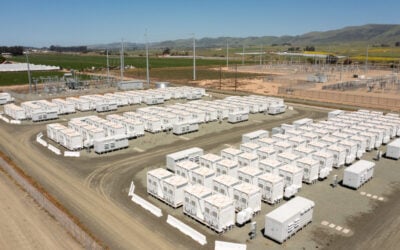
Development of grid-scale battery storage has been put to a temporary halt in Jefferson County, in the US state of Tennessee, after a ruling by County Commissioners.
Following “great public concern” over the siting of planned energy storage facilities, the Board of Commissioners issued an instruction on 27 July that permits or approvals are not to be granted for the development of battery energy storage system (BESS) projects.
Enjoy 12 months of exclusive analysis
- Regular insight and analysis of the industry’s biggest developments
- In-depth interviews with the industry’s leading figures
- Annual digital subscription to the PV Tech Power journal
- Discounts on Solar Media’s portfolio of events, in-person and virtual
A motion was made and passed at a commission meeting to declare a temporary moratorium for six months, allowing time for the consideration of “additional regulations and development standards for BESS uses”.
The board claimed further study and research are necessary prior to the implementation of BESS projects in the county, and said it recognised that “additional regulations and development standards are necessary to protect the health, safety, and welfare of the citizens of Jefferson County”. The Tennessee county is home to just under 60,000 residents.
Jefferson County’s board becomes the latest local authority in the US to enact such a moratorium. According to Energy-Storage.news’ tracking of reports from local media around the country, they have been imposed in a number of towns.
Largely focused on public fears of what might happen in the event of a fire or explosion at a grid-scale BESS, there appears to be the greatest concentration of moratoria in towns around New York State.
Perhaps partly in response to that, but more pertinently to the fact that the state has seen three energy storage system fires since May, New York governor Kathy Hochul has just announced an inter-agency working group will take on the task of verifying the safety of the state’s energy storage projects and set up best practices for future projects.
In many cases, a moratorium is imposed as a direct result of a specific proposed BESS project coming up before local authorities having jurisdiction (AHJs) and meeting public opposition.
In Jefferson County, developer Plus Power is planning to build a 250MW/1,000MWh battery storage asset, called Dumplin Valley. Plus Power is hoping to have Dumplin Valley online by the end of 2027, and sell storage services from the plant to utility Tennessee Valley Authority (TVA).
According to local news outlet 10 News, Plus Power picked the site, in the Tennessee community of Piedmont, due to its “optimal place” on the local transmission network. However, the Board of Commissioners voted to not approve its construction at a meeting earlier in July before going a step further with its moratorium later in the month.
The temporary moratorium remains in place until 27 January 2024.
Moratorium comes after better luck for developer in Massachusetts
Plus Power enjoyed better fortunes in another set of recent development negotiations that involved moratoria. As reported by Energy-Storage.news at the beginning of July, two towns in Massachusetts, Medway and Carver, had enacted a halt to new battery storage – and in the case of Carver, new ground mount solar PV too.
Large-scale BESS project proposals were on the table in both towns, with Plus Power behind one of them, the Cranberry Point 150MW/300MWh BESS facility in the Town of Carver. Both towns had enacted a moratorium on utility-scale BESS as the technology is too new to have been included in local zoning laws.
To cut a long story short, Plus Power and the other developer Eolian were granted zoning law exemptions by the Massachusetts Department of Public Utilities, clearing the path for the projects to start getting necessary approvals from other stakeholders.
“We thank Massachusetts’ leadership for making this decision based on the facts of regional need, project design, minimal environmental footprint, and safety best practices. Battery energy storage is already widely deployed across the country to help decarbonise and modernise electric grids,” Plus Power CEO Brandon O’Keefe said at the time.
“The Cranberry Point Energy Storage project will be a critically-important asset to improve power reliability and clean electricity for Southeast Massachusetts,” O’Keefe said, adding that Plus Power looked forward to working closely with the Town of Carver.
However, a source close to the company commented that the Massachusetts Department of Public Utilities decision was a one-off event, given that it came after a lengthy discussion over which state agency had jurisdiction over energy storage.
That made it difficult to draw conclusions or take precedent from it, the source said, noting that there are a lot of conversations going on in the US today about where the authority should lie for energy storage facilities and their siting.






